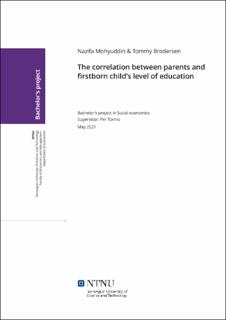The correlation between parents and firstborn child’s level of education.
Bachelor thesis

Permanent lenke
https://hdl.handle.net/11250/2902898Utgivelsesdato
2021Metadata
Vis full innførselSamlinger
Sammendrag
Hensikten med denne oppgaven er å undersøke korrelasjonen mellom foreldrenes og det førstefødte barns utdanningsnivå. Denne studien undersøker om høyere utdanning hos forelder fører til høyere utdanning hos førstefødte barn. Denne oppgaven tar for seg dataen som ble samlet inn i 2017, ved hjelp av runde 3 i livsstudien bestående av tre runder. For å undersøke avhandlingsspørsmålet vil vi hovedsakelig bruke OLS-regresjon, og se på de forskjellige aspektene ved oppgavespørsmålet. Vi undersøker blant annet effekten av å dele foreldrenes og barnas utdanningsnivå inn i kategorier, og kjører OLS-regresjoner blant samme utdanningsgruppe, og på tvers av de forskjellige utdanningsgruppene.
Våre estimeringsresultater viser tydelig at ulike utdanningsnivåer blant foreldre påvirker det førstefødte barnet ulikt. Derimot, antyder testene at vi ikke kan se på denne korrelasjonen uten å vurdere andre signifikante variabler. The purpose of this thesis is to examine the correlation between the parent’s and the firstborn child’s level of education. This study examines whether higher levels of education in parents leads to higher education in their firstborn child. This thesis considers the data collected in 2017 using round 3 of the life study consisting of three rounds. To investigate the thesis question, we will mainly use the OLS-regression and look at the different aspects of the thesis question. We investigate, among other things the effect of dividing the parent’s and child’s education level into categories and running OLS-regression among the same education group, and across the different education groups.Our estimation results clearly show that different levels of education among parents effects the firstborn child differently. However, our tests insinuate that we cannot look at this correlation without considering other significant variables.